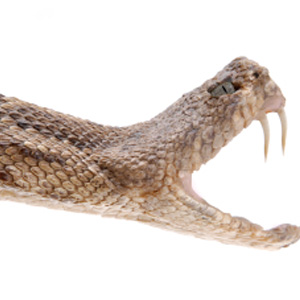
iStock
Laws around keeping snakes in captivity in South Africa are uneven: there are restrictions on the keeping of indigenous snakes and these require permits, except in KwaZulu-Natal where most snakes can still be kept without permits.
There are no laws that govern the keeping of exotic snakes, however, including those with potentially lethal venoms. There are rules controlling the importation of exotics but snakes get smuggled into the country, and are deemed legal once they are here. The end result is that the majority of snake keepers rather keep exotic than indigenous species to avoid having to get permits. There are thousands of people keeping exotic snakes and it’s not unheard of to pay as much as R30 000 for a single snake.
Lethal snakes in private collections
There are an estimated 80-100 potentially deadly exotic species in private collections. Most keepers have no antivenom and thus getting bitten could be a serious problem. Even more so if one of these snakes escapes and bites a third party. There have been numerous escapes of exotics and it’s quite common to find Corn snakes, King snakes, Boas and Burmese pythons in suburban gardens. The occasional deadly exotic has also been caught.
As there is no central antivenom bank in SA, you could receive a bite from a deadly exotic snake and have no access to antivenom. And in very serious bites antivenom may be required to save the victim’s life. Recently an experienced snake handler in Cape Town was bitten by a western diamondback rattlesnake in his collection. Antivenom for rattlesnakes is not freely available in this country, but 15 vials were located at Hartebeespoortdam Snake Park and flown down. The antivenom cost an estimated R75 000.
As exotic antivenoms aren’t registered drugs in this country and regarded as experimental drugs, their cost isn’t covered by medical aid. A keeper bitten by an American cottonmouth last year had to pay R120 000 for antivenom.
Some countries regulate deadly exotics as pets by compelling keepers to have a certain number of hours’ experience working with the snakes as well as strict cage requirements and access to antivenom, while other countries prohibit keeping deadly snakes entirely.
- Adapted from a statement by Johan Marais, African Snakebite Institute
There are no laws that govern the keeping of exotic snakes, however, including those with potentially lethal venoms. There are rules controlling the importation of exotics but snakes get smuggled into the country, and are deemed legal once they are here. The end result is that the majority of snake keepers rather keep exotic than indigenous species to avoid having to get permits. There are thousands of people keeping exotic snakes and it’s not unheard of to pay as much as R30 000 for a single snake.
Lethal snakes in private collections
There are an estimated 80-100 potentially deadly exotic species in private collections. Most keepers have no antivenom and thus getting bitten could be a serious problem. Even more so if one of these snakes escapes and bites a third party. There have been numerous escapes of exotics and it’s quite common to find Corn snakes, King snakes, Boas and Burmese pythons in suburban gardens. The occasional deadly exotic has also been caught.
As there is no central antivenom bank in SA, you could receive a bite from a deadly exotic snake and have no access to antivenom. And in very serious bites antivenom may be required to save the victim’s life. Recently an experienced snake handler in Cape Town was bitten by a western diamondback rattlesnake in his collection. Antivenom for rattlesnakes is not freely available in this country, but 15 vials were located at Hartebeespoortdam Snake Park and flown down. The antivenom cost an estimated R75 000.
As exotic antivenoms aren’t registered drugs in this country and regarded as experimental drugs, their cost isn’t covered by medical aid. A keeper bitten by an American cottonmouth last year had to pay R120 000 for antivenom.
Some countries regulate deadly exotics as pets by compelling keepers to have a certain number of hours’ experience working with the snakes as well as strict cage requirements and access to antivenom, while other countries prohibit keeping deadly snakes entirely.
- Adapted from a statement by Johan Marais, African Snakebite Institute




 Publications
Publications
 Partners
Partners













